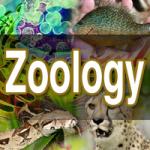|
This section contains 1,869 words (approx. 7 pages at 300 words per page) |

|
Overview
Zoology, the branch of biology that studies animals, seeks to understand the sum total of all the properties of animals and animal populations. As a discipline, zoology is similar to others with major subdivisions that include anatomy, physiology, genetics, and interrelationships.
Much of the early information about human anatomy came from the dissection and study of animals, although some efforts were made to understand and classify animals. It was during the Renaissance that the study of zoology began to separate from human anatomy, as great artists who sought to understand the makeup of both men and animals emerged. Great natural scientists, such as Konrad Gesner (1516-1565), recognized as the father of zoology, developed the field as a scientific inquiry. Other investigators, such as Guillaume Rondelet (1507-1566) and Ulisse Aldrovandi (1522-1605), contributed accurate observations of animals. Natural philosopher and theologian John Ray...
|
This section contains 1,869 words (approx. 7 pages at 300 words per page) |

|


